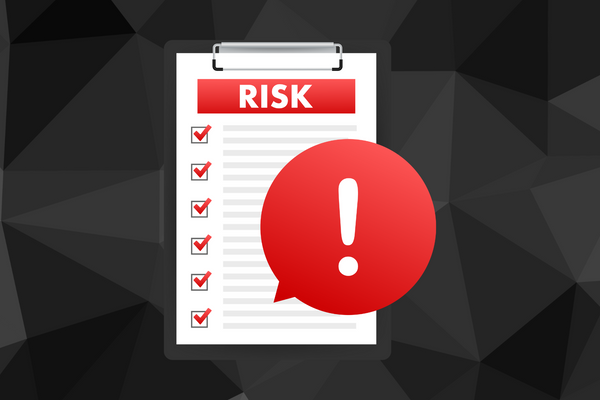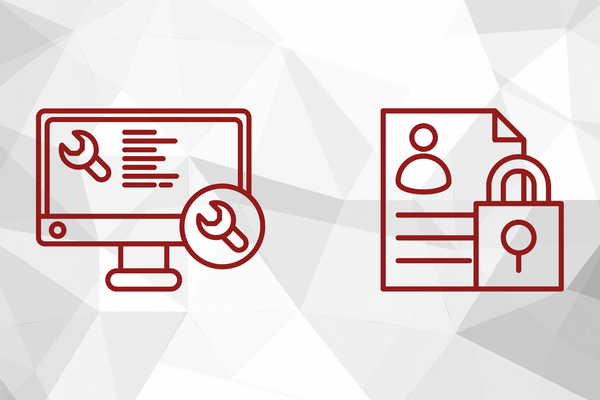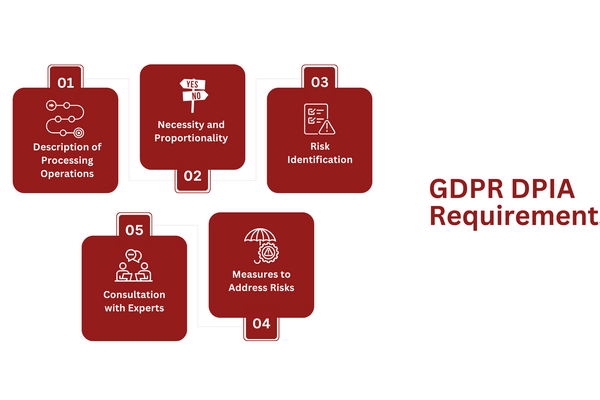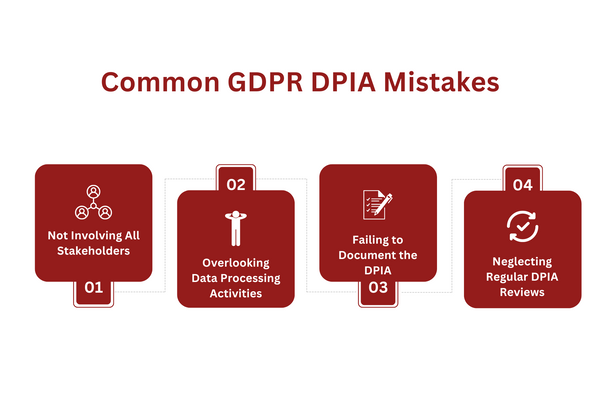
In the constantly evolving landscape of data privacy, understanding GDPR DPIA requirements is essential. As businesses process a growing volume of personal data, ensuring compliance and safeguarding personal information has become a top priority.
This guide will dive deep into the essentials of data protection, highlighting key considerations for businesses navigating the complex waters of GDPR.
As you explore the different parts of data protection impact assessments, you’ll gain a comprehensive understanding of how to conduct them.
Key Takeaways
A Data Protection Impact Assessment (DPIA) is a crucial tool to help businesses identify and mitigate data privacy risks, ensuring GDPR compliance and balancing operational needs and individual data rights.
A DPIA is needed when introducing new projects, processing large-scale special data, or monitoring public areas, ensuring that personal data remains protected and respected at all times.
Avoid common DPIA mistakes by involving all stakeholders, accurately documenting all data processing activities, ensuring data necessity and proportionality, keeping thorough DPIA documentation, and regularly reviewing and updating the DPIA as the data landscape evolves.
Understanding What a DPIA is
Understanding What a DPIA is.png

A Data Protection Impact Assessment (DPIA) is an important tool that assists businesses in identifying, evaluating, and minimizing data protection risks.
James Shreves, a partner and cybersecurity chair at Thomas Coburn LLP, says:
“A DPIA is an audit of how personal information is collected, used, and shared. The DPIA originated with the EU, but like other parts of the EU General Data Protection Regulation, the DPIA is becoming part of US law through new state privacy laws.”
At its core, it’s a tool designed to assess the potential impacts on the privacy of individuals when their personal information is processed, ensuring a business’s compliance with GDPR rules.
James further emphasizes the importance of the GDPR DPIA by saying:
“A DPIA can provide important insight into the nature and amount of sensitive or higher-risk personal information a company has, where that data is stored, processed, and transmitted, how the data is used, and with what entities the data is shared. This can be of great value in determining compliance with privacy requirements as well as in planning and assessing artificial intelligence or cybersecurity programs.”
With this information, businesses can implement measures to mitigate these data protection risks. This fosters trust with people and underscores the business’s commitment to data protection.
Furthermore, the DPIA isn’t just about mitigating risks; it’s about understanding and optimizing the entire data processing activity. This means ensuring that personal data is processed efficiently and transparently.
The end game? A seamless integration of data protection compliance services and operations, with the goal of safeguarding data subject rights.
When is a GDPR DPIA Needed?
When is a GDPR DPIA Required to Do.png

Every business must know when to carry out a DPIA. In the world of GDPR, it’s not something to guess about. In essence, if what you’re doing might put someone’s personal data at risk, you need a DPIA.
So, when exactly should a business think about this?
James Shreve says:
“GDPR requires that data protection authorities be notified of data “processing operations which are likely to result in a high risk to the rights and freedoms of natural persons by virtue of their nature, scope, context, and purposes.” The DPIA is a central part of the procedure to determine if there is such a “high risk.””
So, if there’s a new project or system being introduced that will process personal data, you will generally need a DPIA. If there’s any sort of large-scale data processing activity of data or sensitive data being processed (like health details), a DPIA is also needed.
It’s also vital when a business starts looking into new technology that involves personal data. And let’s not forget about public monitoring. If a business plans to monitor a public area, especially on a large scale, a DPIA can’t be skipped.
Being on top of these requirements isn’t just about ticking off boxes for GDPR compliance. It’s about making sure people’s personal information is respected and safe.
Do you think your business needs a DPIA? If so, getting it done by professionals is your best bet. Get in touch with us for a free consultation today.
GDPR DPIA Requirements
GDPR DPIA Requirements.png

Understanding the precise DPIA requirements is a must for every business. It’s not just about ticking off a checklist. It’s about genuinely securing personal data. So, what should be inside a DPIA? Let’s break it down step-by-step:
Description of Processing Operations
Every DPIA starts with this. Here, businesses detail how they will handle personal data. This section is like a roadmap. It explains what data is collected, where it comes from, and where it’ll go. By being clear about this, businesses make sure they’re on track for GDPR compliance.
Necessity and Proportionality
In this part, businesses answer two big questions. First, “Why do we need to process this personal data?” Then, “Are we doing too much or too little?” It’s all about making sure that personal data processing is essential and done just right. Nothing more, nothing less.
Potential Risk Identification
This is where the spotlight shines on potential problems. Businesses have to find areas where data privacy risks might pop up. This could be about how data is stored, who can see it, or even how it’s shared. Recognizing these risks is the first step to dealing with them.
Measures to Address Risks
After finding the risks, it’s action time. In this section, they’ll describe the steps to keep personal data safe. This can include GDPR solutions, training, or even hiring a data protection officer.
Consultation with Experts
If businesses get stuck, this step can help. Consult Captain Compliance to understand the risks or best practices. This way, you’ll have a clearer and more valid approach to dealing with personal data.
How to Conduct a GDPR DPIA
Navigating the path of a GDPR DPIA might seem daunting for many businesses. But think of it like assembling a jigsaw puzzle: with the right pieces in hand and a clear picture in mind, everything falls into place. So, here’s how to conduct a GDPR DPIA:
Determine if a DPIA is Needed
Before diving in, businesses should ask, “Do we really need a DPIA?” If they’re dealing with personal data in ways that might pose a high risk to data privacy, the answer’s probably ‘yes.’
Identify Data Protection Processes and Tools
Here, businesses take a closer look at the tools and processes they use for data protection. Whether it’s GDPR solutions or specific software, it’s vital to know what’s in the toolkit.
Ensure Data is Adequate and Relevant
Businesses need to check the data they’re collecting. Are they grabbing too much data or any unnecessary data? It’s all about getting just the right amount. This step ensures they’re only holding onto personal information that’s truly needed, nothing more.
Conduct a Risk Analysis
This step is a deep dive. Businesses need to figure out where data privacy risks might sneak in. By doing a thorough risk analysis, they can spot potential pitfalls before they become big problems.
Craft a Risk Mitigation Plan
Once risks are identified, it’s time for action. In this part, businesses map out how they’ll handle any issues. They’ll decide on the best compliance solutions and maybe even think about whether to outsource compliance to experts like Captain Compliance. This is the game plan for keeping data safe.
Sign-off and Review
Finally, after all the hard work, businesses need to get their DPIA approved. This usually means getting a data protection officer or another expert to give it the green light. But it’s not just about getting a thumbs-up.
Find that these requirements seem confusing? Fear not! Contact Captain Compliance to get a clear overview of how your business should handle DPIAs.
Common GDPR DPIA Mistakes
Common GDPR DPIA Mistakes.png

Every business, whether a data controller or processor, is required to do GDPR DPIAs when dealing with personal data that poses a high risk to individuals. However, the journey doesn’t always go smoothly.
Just like any journey, mistakes are bound to happen. Knowing where most businesses fail helps you chart a safer course. Here are the most common mistakes and how to avoid them:
Not Involving All Stakeholders
One of the biggest mistakes is sidelining key players, especially data subjects. The DPIA isn’t a solo voyage.
Every stakeholder, from data protection officers to the very individuals whose data is being processed, has a role to play. Missing out on their insights might lead to an incomplete or skewed risk assessment.
Overlooking Data Processing Activities
Every piece of personal data that a business handles, every step of the way it’s processed, matters. Yet, many businesses often skip or overlook some of these activities. The danger? It’s like missing puzzle pieces – you won’t see the whole picture. And in the GDPR world, that incomplete picture can spell disaster in terms of compliance.
Failing to Document the DPIA
Think of the DPIA documentation as the captain’s log of your GDPR journey. It’s where you note down everything: risks, mitigation strategies, consultations, and more. It’s also great evidence supporting a case that you take data privacy seriously in a court of law.
Yet, many businesses still forego this crucial step and opt for an informal list instead. Failing to document your DPIA properly can lead to GDPR compliance failures, with hefty fines to follow if you’re found lacking.
Neglecting Regular DPIA Reviews
The world of data protection is as changing as the tides. That means the DPIA isn’t a one-and-done deal. Failing to regularly review and update the DPIA, especially when processing changes or new risks emerge, can set businesses apart.
Frequently Asked Questions (FAQs)
Why are Data Protection Impact Assessments needed?
A DPIA is essential as it helps businesses identify, assess, and mitigate data privacy risks associated with processing personal data, ensuring GDPR compliance and safeguarding individual data rights.
Want to grasp the depth of DPIA’s significance? Learn more here!
Can I rely solely on DPIA for GDPR compliance?
While a DPIA is a critical component of GDPR compliance, it’s just one piece of the puzzle. Other elements like having a Data Protection Officer, implementing robust data protection measures, and ensuring continuous training are also vital.
Want a comprehensive approach to GDPR compliance? Discover how Captain Compliance offers an all-rounded solution.
How frequently should a DPIA be reviewed and updated?
A DPIA isn’t a one-time activity. It should be regularly reviewed and updated, especially when there are changes in processing activities or new data privacy risks emerge. You should review and update once per year.
Ensure your DPIA remains current and relevant. Find out more about our services here.
When should a business conduct a DPIA?
A business should consider a DPIA when introducing new projects or systems, processing special categories of data, exploring new technologies involving personal data, or planning large-scale public monitoring.
Unsure if your business activities require a DPIA? Reach out to us to help you!
How Can Captain Compliance Help You?
Now, the real challenge starts where you need to apply it all. But here’s the silver lining: You don’t have to navigate these waters alone.
Captain Compliance and our team of superheroes can help you with corporate compliance. We specialize in offering data protection compliance services tailored to your needs. From data compliance solutions to hands-on compliance training, we’ve got you covered.
Take the next step: Don’t let GDPR DPIA requirements be an anchor dragging your business down. Reach out to us today for a complimentary consultation, and let us chart a clear course for your business toward seamless GDPR compliance and beyond.